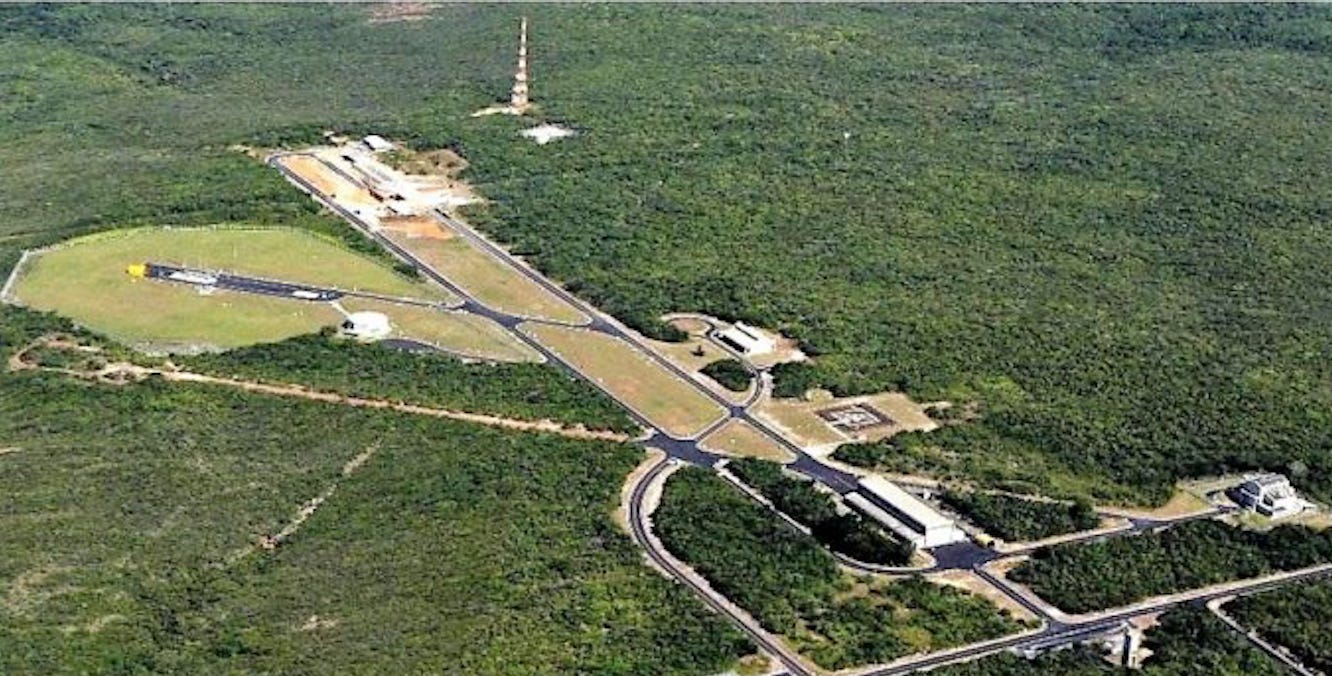Latin America Space Roundup: 23 May to 5 June 2025
A summary of all the space news in Latin America over the past two weeks, brought to you by AzurX

The following are the major space developments in the Latin American region tracked by Latin America Space Monitor over the past two weeks:
Brazil Space News
South Korea’s INNOSPACE Delays Launch From Brazil’s Alcântara Launch Site
South Korea’s INNOSPACE has postponed the first commercial launch from Brazil’s Alcântara Space Center of its HANBIT-Nano small satellite launch vehicle to the second half of 2025, citing technical issues uncovered during propellant system tests related to its hybrid propulsion and electric pump systems. The delay follows an earlier rescheduling from March to July 2025 due to component and facility delays. The company emphasized that the decision reflects a commitment to mission reliability and customer responsibility, with stage qualification tests set to begin soon—an essential step before launch approval.
Nigeria Seeking to Deepen Collaboration With Brazil in Space and Satellites
Nigeria is seeking to deepen its collaboration with Brazil across space and satellite domains, as part of broader innovation and green energy initiatives. During a bilateral meeting in Abuja, the director-general of Nigeria’s National Space Research and Development Agency (NASRDA), Dr. Matthew Adepoju, highlighted the country’s intent to expand its satellite capabilities in areas such as remote sensing, climate monitoring, border security, and disaster response. This emerging space partnership complements Nigeria’s parallel efforts to build Africa’s largest green methanol industrial complex, positioning space-based technologies as critical enablers of economic diversification and sustainable development.
Brazil’s ANATEL Issues Licenses to Viasat and Intelsat for Satellite Broadband Services
Brazil's telecommunications regulator, Anatel, has granted operating licenses to satellite communications companies Viasat and Intelsat, authorizing them to provide satellite capacity and connectivity services within the country's territory and orbital slots. This move aligns with Brazil's strategic goal of expanding broadband access and reducing digital inequalities across both urban and remote regions. By integrating these global satellite operators into its national infrastructure, Brazil aims to enhance its telecommunications capabilities and foster greater digital inclusion.
Brazil-China Space Cooperation Prime Example of South-South Collaboration
Brazil and China have elevated their four-decade space partnership from Earth observation satellites to ambitious deep space initiatives, exemplified by the construction of the BINGO radio telescope in Brazil’s Paraíba state. This South–South collaboration, anchored by the jointly developed CBERS satellites used globally for environmental monitoring, demonstrates how emerging powers can drive scientific and technological innovation outside traditional North-led frameworks. Beyond satellite development, the alliance is fostering regional development and scientific capacity through infrastructure like BINGO, while reinforcing the strategic role of space cooperation in environmental stewardship and planetary research.
China-Brazil CBERS Program Foundation of China’s International Space Cooperation
China’s Tianwen-2 asteroid mission launch on the eve of National Science and Technology Workers Day highlighted the country’s deepening commitment to space innovation, international cooperation, and the philosophy of "technology for good purposes." A flagship example is the longstanding China–Brazil Earth Resources Satellite (CBERS) program, which has provided critical Earth observation data to developing countries across Latin America, Africa, and Southeast Asia. Rooted in South–South cooperation and bolstered by open data sharing, CBERS reflects China’s ambition to pair technological self-reliance with global space leadership, promoting equitable access to space-derived solutions for climate, agriculture, and disaster management.
Novaspace Makes Inaugural Appearance at Brazil’s SpaceBR Show
At this year’s SpaceBR Show in São Paulo, Brazil, Novaspace is hosting its first exclusive booth, showcasing its capabilities in space consulting, market intelligence, and global event organization. Known for influential publications like the Space Economy Report and Government Space Programs, Novaspace offers strategic insights and tailored advisory services to stakeholders across the space sector. The booth also promotes its flagship events, including World Space Business Week in Paris and LATSAT in Latin America, both critical forums for industry leaders addressing connectivity, security, and satellite innovation.
New Book: Space Fostering Brazilian Society: Developing Brazil Through Space
The newly published volume Space Fostering Brazilian Society: Developing Brazil Through Space (Springer Cham, 2025), edited by Ian Grosner and Annette Froehlich, offers a timely, peer-reviewed analysis of Brazil’s accelerating space sector and its integration into the country’s broader development agenda. Highlighting how space technologies are already contributing to social, economic, and governance outcomes—from poverty alleviation to rural development—the book positions space as a critical enabler of Brazil’s long-term national objectives, with significant untapped potential for further societal impact.
Argentina Space Developments
Argentina’s Telecentro Empresas Partners With Starlink to Provide LEO SATCOM
Telecentro Empresas has formed a strategic alliance with SpaceX’s Starlink to deliver high-speed, low-latency satellite internet across Argentina, targeting underserved rural and remote areas. This partnership significantly enhances Telecentro’s ICT offering by integrating Starlink’s satellite connectivity with its national fiber and IP/MPLS infrastructure, supported by Tier IV data centers and professional technical services. Aimed at boosting digital transformation and operational resilience, the solution is tailored for sectors such as education, public safety, agriculture, and mining, with full compatibility for enterprise-grade technologies like VPN, SD-WAN, and firewalls.
Cuba Space Developments
Cuba Endorses UN Proposal That Targets Starlink Satellite Internet
A coalition of authoritarian-leaning states—including Cuba, Russia, Iran, and North Korea—has endorsed a new UN cybercrime convention that emphasizes “state sovereignty” over digital spaces and implicitly targets satellite-based internet services like Starlink. The joint declaration criticizes foreign digital interference and technologies that provide uncensored access, such as Starlink’s role in supporting free information flows in repressive environments like Cuba and Iran. The agreement raises concerns over its potential use to justify censorship and suppress dissent under the guise of cybersecurity. Notably, Russia is leveraging Cuba as a regional tech hub to expand digital influence in Latin America, further embedding satellite and cybersecurity infrastructure aligned with Moscow’s geopolitical aims.
Paraguay Space News
Paraguay and India to Pursue Cooperation in Space and Satellite Development
Paraguay and India have identified space and satellite cooperation as a promising area within a broader strategic partnership, underscored during Paraguayan President Santiago Peña’s first visit to India. Prime Minister Narendra Modi highlighted space among key sectors—alongside digital technology, critical minerals, and defense—where the two countries can deepen ties under the India–MERCOSUR Preferential Trade Agreement. As India seeks to expand its space diplomacy and technological footprint in Latin America, Paraguay's resource wealth and neutral geopolitical stance offer a stable entry point for advancing bilateral and regional space collaboration.

Uruguay Space Developments
Uruguay’s Satellogic Seeks More Cash to Build Out Earth Observation Constellation
Earth observation firm Satellogic, listed on Nasdaq, is relocating its headquarters from the British Virgin Islands to the U.S. as it seeks fresh capital to scale its 200+ satellite mega-constellation. With 19 satellites currently in orbit, operations based in Uruguay, and business development centered in Miami, the company reported Q1 2024 revenues of $33.3 million and a reduced loss of $9.5 million. A strategic partnership with Maxar Intelligence supports its commercial footprint, but continued growth hinges on new satellite launches and securing additional funding amid tightening cash reserves.
Other Regional Space News
Bolivia and Brazil Benefit From China’s Space Education Initiative
China’s UN-backed space education initiative at Beihang University is fostering the next generation of space professionals from emerging economies, with students from Bolivia and Brazil playing prominent roles. Brazilian participants aim to apply their training in space product management and satellite data processing to strengthen Brazil’s aerospace sector, while a Bolivian student expressed plans to launch a national space startup. These efforts reflect a growing South-South collaboration in space, with China positioning itself as a key enabler of talent development and capacity building across Latin America’s rising space actors.
SES Expands O3b mPower Network With Ground Stations in Brazil, Peru, and Chile
SES has expanded its O3b mPOWER satellite network across Latin America with new ground stations in Brazil, Peru, and Chile, supported in part by Microsoft Azure data centers as part of a strategic partnership aimed at enhancing cloud connectivity. With 12 operational gateways globally and more satellites scheduled for launch, SES is scaling its MEO constellation to triple network capacity by 2027, targeting government, mobility, enterprise, and cloud markets. The company reported steady Q1 performance with revenue growth in networks, including a new contract in Brazil with Mileto (formerly Oi TV).
Opinion: Institutional Strength of Latin American Space Agencies Matters
Writing for Latin America Space Monitor, Laura Delgado López - a leading expert on Latin American space policy and programs - argues that recent institutional shakeups in Argentina and Mexico—where longstanding space agencies CONAE and AEM face merger or absorption—have triggered debate over the role and resilience of national space institutions in Latin America. While Argentina’s CONAE, a technically mature and diplomatically active agency, has seen strong resistance to its dismantling, Mexico’s AEM was restructured with little opposition, reflecting its weaker institutional foothold. These contrasting cases underscore a broader regional truth: the presence of a space agency alone is not sufficient. Lasting space programs require institutional continuity, legal authority, stakeholder engagement, and political support to serve scientific, industrial, and strategic goals effectively.
Opinion: Latin American Dependence on Foreign LEO SATCOM Services Creates Geopolitical Vulnerabilities
As low-Earth orbit (LEO) satellite constellations become vital infrastructure for connectivity and national security, Latin America—particularly Brazil—faces strategic choices with far-reaching implications, according to analysis by Rex Fox O’Loughlin for the International Institute for Strategic Studies (IISS). Brazil’s engagement with China’s Qianfan constellation reflects growing regional interest in alternatives to Starlink amid rising concerns over data sovereignty and geopolitical leverage. The U.S. threat to restrict Ukraine’s access to Starlink unless it ceded critical minerals illustrates how satellite internet can become a tool of coercion. For Latin American countries, reliance on foreign LEO providers risks political and operational vulnerability in future crises. Without sovereign or regionally controlled LEO capabilities, Brazil and its neighbors could find themselves subject to the strategic preferences of external powers—highlighting an urgent need for regional dialogue, investment, and partnerships to build autonomous space-based communications infrastructure.
Be sure to catch up with space activities in the region in the next edition of Latin America Space Monitor’s space roundup!










